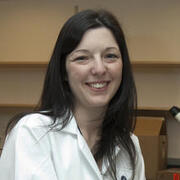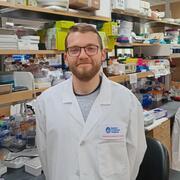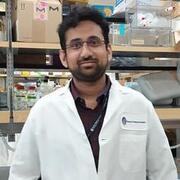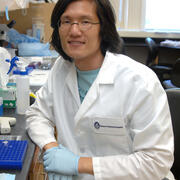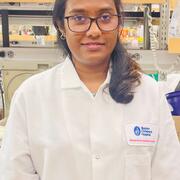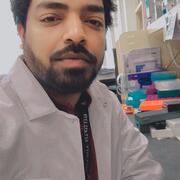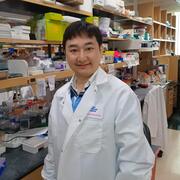Lab Members
-
Andreane Cartier
Staff Scientist, Vascular Biology Program, Boston Children's Hospital
Instructor, Harvard Medical School
Andreane did her PhD in the lab of Dr. Jean-Luc Parent in Sherbrooke, Quebec, where she studied the interaction between WDR36 and thromboxane A2 receptor (TPβ), and its impact on downstream signaling. Her training with Dr. Timothy Hla gives her the opportunity to apply her knowledge of GPCR signaling, molecular biology and transcriptional gene regulation to different mice models. She first published her work with Dr. Hla on the role of endothelial S1P receptors in tumor angiogenesis, tumor growth and anti-tumor therapy efficacy. She also performed a Whole Genome siRNA Screen to identify new targets of the endocytic pathway of S1PR1 induced by Fingolimod, a synthetic functional antagonist of S1PR1 and FDA approved molecule, currently used as a treatment for multiple sclerosis.She is interested in the role of S1PR1 and S1PR2 in vascular dysfunction caused by a chronic inflammatory environment in vitro and in vivo, and how the imbalance of these two receptors leads to endothelial dysfunction and vascular injury, key processes in cardiovascular disease development.Publications HighlightsBrazee PL, Cartier A, Kuo A, Haring AM, Nguyen T, Hariri LP, Griffith JW, Hla T, Medoff BD, Knipe RS. Augmentation of Endothelial S1PR1 Attenuates Post-Viral Pulmonary Fibrosis. Am J Respir Cell Mol Biol. 2023
Cartier A, Leigh T, Liu CH, Hla T. Endothelial sphingosine 1-phosphate receptors promote vascular normalization and antitumor therapy. Proc Natl Acad Sci U S A. 2020
Cartier A, Hla T. Sphingosine 1-phosphate: Lipid signaling in pathology and therapy. Science. 2019
Email: Andreane.Cartier@childrens.harvard.edu
Phone: (617) 919-2404 -
Li Chao
Research Fellow, Vascular Biology Program, Boston Children's Hospital
Research Fellow, Harvard Medical School
Chao completed his PhD in Genetics at Fudan University in 2022, where his research primarily focused on the mechanisms by which noncoding RNAs contribute to the development of congenital heart diseases. This work paved the way for his interest in molecular biology and gene regulation within cardiovascular development and pathologies. Building upon his expertise in genetic regulation and signaling pathways, he joined the laboratory of Dr. Timothy Hla in Jaunuary 2024. Chao is actively involved in researching the role of the S1P signaling pathway in cardiac development and aortic aging. He hopes to apply and expand his knowledge of signaling pathways, specifically in the context of development and aging, to understand potential therapeutic targeting of cardiovascular conditions.
Publication Highlights:
Li, C., Li, H., Yao, X., Liu, D., Wang, Y., Huang, X., ... & Wang, H. (2022). Master microRNA-222 regulates cardiac microRNA maturation and triggers Tetralogy of Fallot. Signal Transduction and Targeted Therapy, 7(1), 1-4.
Li, C., Ni, J., Liu, Y. X., Wang, H., Liang, Z. Q., & Wang, X. (2017). Response of MiRNA-22-3p and MiRNA-149-5p to folate deficiency and the differential regulation of MTHFR expression in normal and cancerous human hepatocytes. PloS one, 12(1), e0168049.
Zhang, H., Lu, L., Li, C., Li, H., Tian, J., & Wang, H. (2022). Downregulated nuclear lncRNA NRON inhibits SHP2/Wnt/β-catenin signaling and cardiomyocyte differentiation during the development of Tetralogy of Fallot. Genes & Diseases.
-
Tim Dorweiler
Research Fellow, Vascular Biology Program, Boston Children's Hospital
Research Fellow, Harvard Medical School
Tim earned his BS from Heinrich-Heine University in Duesseldorf (Germany) in association with Michigan State University (USA). His thesis described a potential mechanism of how dextromethorphan derived anti-diabetics promote insulin secretion. Subsequently, he acquired his MS at the German Diabetes Center (Duesseldorf, Germany), developing insulin secretagogues with vascular protective properties for the treatment of diabetes. Tim returned to Michigan State University for his PhD study to focus on the role of dyslipidemia in microvascular complications of diabetes under Prof. Julia Busik. His thesis pioneered the pathological role of cholesterol crystal formation and ceramide-rich platform formation in diabetic retinopathy pathogenesis.
Tim joined the Hla lab in February of 2024 as a Postdoctoral Fellow to expand his expertise on the role of sphingolipids in vascular health and disease, aiming to elucidate the therapeutic potential of S1P designer chaperones in metabolic and microvascular diseases.
Selected Publications:
Dorweiler TF and Singh A, Ganju A, Lydic T, Glazer L, Kolesnick RN, Busik JV. Diabetic Retinopathy is Ceramidopathy Reversed by Anti-Ceramide Immunotherapy. Cell Metabolism. 2024.
Dorweiler TF and Hammer SS, McFarland D, Adu-Agyeiwaah Y, Mast N, El-Darzi N, Fortmann SD, Nooti S, Agrawal DK, Pikuleva IA, Abela GS, Grant MB, Busik JV. Cholesterol crystal formation is a unifying pathogenic mechanism in the development of diabetic retinopathy. Diabetologia. 2023 Sep;66(9):1705-1718. doi: 10.1007/s00125-023-05949-w. Epub 2023 Jun 14. PMID: 37311879; PMCID: PMC10390399.
Wistrup Torm ME, Dorweiler TF, Fickweiler W, Levine RS, Fort PE, Sun JK, Gardner TW, Frontiers in diabetic retinal disease, Journal of Diabetes and its Complications, Volume 37, Issue 2, 2023, 108386, ISSN 1056-8727.
-
Ingo Fohmann
Research Fellow, Vascular Biology Program, Boston Children's Hospital
Research Fellow, Harvard Medical School
Ingo received his PhD from the Institute for Hygiene and Microbiology in Würzburg, Germany. During his PhD project he was interested in the function of sphingolipids in the brain endothelium during infection with the bacterial pathogen Neisseria meningitidis. He discovered that the infection leads to the activation of the SPHK1-S1PR2-EGFR axis and that reversing this effect is a promising strategy to prevent bacterial invasion.
Ingo joined the lab in November 2024 for his postdoctoral studies, where he will investigate the epigenetic regulation of S1PRs during neonatal meningitis.
Publication highlights:
Peters S, Fohmann I, Rudel T, Schubert-Unkmeir A (2021) A Comprehensive Review on the Interplay between Neisseria spp. and Host Sphingolipid Metabolites. Cells.
Fohmann I, Weinmann A, Schumacher F, Peters S, Prell A, Weigel C, Spiegel S, Kleuser B, Schubert-Unkmeir A (2023). Sphingosine kinase 1/S1P receptor signaling axis is essential for cellular uptake of Neisseria meningitidis in brain endothelial cells. PLOS Pathogens.
Batliner M, Schumacher F, Wigger D, Vivas W, Prell A, Fohmann I, Köhler T, Schempp R, Riedel A, Vaeth M et al (2024) The Candida albicans quorum-sensing molecule farnesol alters sphingolipid metabolism in human monocyte-derived dendritic cells. mBio.
E-mail: Ingo.fohmann@childrens.harvard.edu
-
Avishek Ghosh
Research Fellow, Vascular Biology Program, Boston Children's Hospital
Research Fellow, Harvard Medical School
Avishek received his Bachelor degree in Science in Microbiology from St. Xavier’s College, Kolkata under Calcutta University in 2012. After that, he moved to Bangalore to join the National Centre for Biological Sciences, TIFR to do his Integrated MSc-PhD in Biology under the guidance of Dr. Raghu Padinjat, from where he graduated in December, 2020. During his PhD in India, Avishek worked out the biochemical function of a metazoan lipid kinase called PIP4K in the context of regulating cell size, using new LC-MS/MS methods and Drosophila as a model system.
He joined the Hla lab in April, 2021 for post-doctoral training to expand his training on lipid signalling in metazoans. His initial interest in the Hla lab is to understand the fundamental basis of biased signalling outputs of the Sphingosine 1-phosphate receptor 1 (S1PR1) using in vitro cell culture models.
Publications Highlights:
Ghosh, A., Raghu, P. (2021). Label-Free Quantification of Phosphoinositides in Drosophila by Mass Spectrometry. Methods Mol Biol
Mathre, S., Reddy, K.B., Ramya, V., Krishnan, H., Ghosh, A., and Raghu, P. (2019). Functional analysis of the biochemical activity of mammalian phosphatidylinositol 5 phosphate 4-kinase enzymes. Biosci Rep
Ghosh A, Sharma S, Shinde D, Ramya V, Raghu P. (2019). A novel mass assay to measure phosphatidylinositol-5-phosphate from cells and tissues. Biosci Rep
Email: avishek.ghosh@childrens.harvard.edu
-
Bongnam Jung
Senior Staff Scientist, Vascular Biology Program, Boston Children's Hospital
Research Associate, Harvard Medical School
Bongnam did her PhD in Cellular and Developmental Biology at Cornell University, New York. During her study, she worked on the role of Sphingosine 1-phosphate (S1P) receptor 1 in retinal vascular development using in vitro and in vivo systems under the guidance of Dr. Timothy Hla. She went to Sweden to do her Post-doctoral training with Dr. Christer Betsholtz, learning more about the central nervous system (CNS) vascular system. She was interested in characterizing pericytes, the cells surrounding the endothelium, over the course of brain development in mouse. She also investigated the involvement of fibroblast growth factor binding protein 1 (FGFBP1) in pericyte deficiency-mediated blood brain barrier breakdown. She joined back the Hla lab in Feb, 2019 and wants to continue studying S1P/ S1P receptors in the CNS and their underlying mechanisms in health and disease.Publication HighlightsNiaudet C, Jung B, Kuo A, Swendeman S, Bull E, Seno T, Crocker R, Fu Z, Smith LEH, Hla T. Therapeutic activation of endothelial sphingosine-1-phosphate receptor 1 by chaperone-bound S1P suppresses proliferative retinal neovascularization. EMBO Mol Med. 2023
Yanagida K, Engelbrecht E, Niaudet C, Jung B, Gaengel K, Holton K, Swendeman S, Liu CH, Levesque MV, Kuo A, Fu Z, Smith LEH, Betsholtz C, Hla T. Sphingosine 1-Phosphate Receptor Signaling Establishes AP-1 Gradients to Allow for Retinal Endothelial Cell Specialization. Dev Cell. 2020
Jung B, Arnold TD, Raschperger E, Gaengel K, Betsholtz C. Visualization of vascular mural cells in developing brain using genetically labeled transgenic reporter mice. J Cereb Blood Flow Metab. 2018
Phone: 617-919-2166 -
Andrew Kuo
Staff Scientist, Boston Children's Hospital
Instructor, Harvard Medical School
Andrew received his Bachelor Degree in Zoology from National Taiwan University. Further, he completed his PhD training in Cell Biology under the laboratory of Dr. William Sessa, where he became interested in lipid metabolism in the vasculature system, particular triglyceride metabolism in the endothelium. His thesis project characterized Lipid Droplets (LD) for the first time in endothelial cells and demonstrated endothelium LD function as a buffer for lipid homeostasis and transport lipids to subendothelial layer.Andrew joined the Hla lab in May, 2017 to continue his postdoctoral training studying sphingolipid biology. His current research interests include understanding S1P compartmentalization and availability in the blood brain barrier and investigating the functions of S1P bound to different chaperones in vitro and in vivo.Publications HighlightsNiaudet C, Jung B, Kuo A, Swendeman S, Bull E, Seno T, Crocker R, Fu Z, Smith LEH, Hla T. Therapeutic activation of endothelial sphingosine-1-phosphate receptor 1 by chaperone-bound S1P suppresses proliferative retinal neovascularization. EMBO Mol Med. 2023
Kuo A, Checa A, Niaudet C, Jung B, Fu Z, Wheelock CE, Singh SA, Aikawa M, Smith LE, Proia RL, Hla T. Murine endothelial serine palmitoyltransferase 1 (SPTLC1) is required for vascular development and systemic sphingolipid homeostasis. Elife. 2022
Kuo A, Lee MY, Yang K, Gross RW, Sessa WC. Caveolin-1 regulates lipid droplet metabolism in endothelial cells via autocrine prostacyclin-stimulated, cAMP-mediated lipolysis. J Biol Chem. 2018
Phone: (617) 919-2403 -
Daniel Lin
Research Fellow, Vascular Biology Program, Boston Children's Hospital
Research Fellow, Harvard Medical School
Daniel did his Ph.D. training by joining the double Ph.D. program at both University of Tsukuba, Japan and National Taiwan University, Taiwan. He received the first Ph.D. at University of Tsukuba under Dr. Yasunori Kanaho, where he characterized the lymphangiogenesis role of small GTPase Arf6 in embryonic development and cancer progression and how Arf6 regulates intracellular trafficking of b1 integrin (Lin et al., Scientific Report, 2017). In addition, he received the second Ph.D. from National Taiwan University under Dr. Hsinyu Lee, where he found the VEGF-C signaling pathway mediated by lipid mediator lysophosphatidic acid (LPA) in human prostate cancer, and how it regulates tumor lymphangiogenesis and lymphatic metastasis (Lin et al., BBA-Moll Cell Biol Lipids, 2018).
Daniel joined the Hla lab in September 2019 to investigate the role of S1P receptor 2 in lymphatic vessel development at embryonic stages and pathological conditions.
Publication Highlights
Lin YC, Chen CC, Chen WM, Lu KY, Shen TL, Jou YC, Shen CH, Ohbayashi N, Kanaho Y, Huang YL, Lee H. (2018). LPA1/3 Signaling Mediates Tumor Lymphangiogenesis through Promoting CRT Expression in Prostate Cancer. Biochimica et Biophysica Acta – Molecular and Cell Biology of Lipids.
Huang YL, Lin YC, Lin CC, Chen WM, Chen B, Lee H. (2018). High Glucose Induces VEGF-C Expression via the LPA1/3-Akt-ROS-LEDGF Signaling Axis in Human Prostate Cancer PC-3 Cells. Cellular Physiology and Biochemistry.
Lin YC, Ohbayashi N, Hongu T, Katagiri N, Funakoshi Y, Lee H, Kanaho Y. (2017). Arf6 in Lymphatic Endothelial Cells Regulates Lymphangiogenesis by Controlling Directional Cell Migration. Scientific Reports.
-
Dushani Ranasinghe
Research Fellow, Vascular Biology Program, Boston Children's Hospital
Research Fellow, Harvard Medical School
Dushani earned a Bachelor's degree in Biochemistry and Molecular Biology from the University of Colombo in Sri Lanka. She then enrolled in the University of Notre Dame to pursue a PhD in Biochemistry, conducting research under the guidance of Dr. Margaret Schwarz. Her doctoral project identified Endothelial Monocyte Activating Polypeptide II (EMAP II) as a strategic early regulator of SPHKs and unique identification of EMAP II mediated signaling and epigenetic activity of sphingosine kinases in the pulmonary hypertension lung vasculature.
Dushani joined the lab of Dr. Timothy Hla in February 2023, where she intends to study the role of systemic and environmental factors on sphingolipid metabolism and the epigenetic and transcriptional regulation of genes that metabolize sphingolipids in the breakdown of the blood-brain barrier during the aging process.
Publication highlights:
Ranasinghe ADCU, Schwarz MA. Integrating epigenetics and metabolomics to advance treatments for pulmonary arterial hypertension. Biochem Pharmacol. 2022
Ranasinghe ADCU, Lee DD., Schwarz MA. EMAPII mediated transcriptional regulation and translocation of SPHK1 in pulmonary smooth muscle cells. Biochimica et Biophysica Acta - Molecular and Cell Biology of Lipids. 2020
Tennakoon TMPB, Rushdhi M, Ranasinghe ADCU et al. Values of molecular markers in the differential diagnosis of thyroid abnormalities. J Cancer Res Clin Oncol. 2016
Email: dushani.ranasinghe@childrens.harvard.edu
-
Raj Sah
Research Fellow, Vascular Biology Program, Boston Children's Hospital
Research Fellow, Harvard Medical School
Raj received Bachelor's and Master's degrees in Biomedical Sciences from the University of Delhi, India. He then pursued his doctorate at the Jawaharlal Nehru University, Delhi, India, in the laboratory of professor Shailja Singh. In his doctoral studies, Raj studied how Sphingosine-1-Phosphate is involved in Plasmodium falciparum malaria parasite growth and development as well as how the parasite utilizes sphingolipids from both intraerythrocytic and extracellular reservoirs for its growth and development during the pathogenic asexual blood stages and transmissible gametocyte stages, which are essential to malaria parasite life cycle progression.
The goal of his research in Dr. Timothy Hla's laboratory is to increase his understanding of sphingolipid biology in in vivo and in vitro. Raj joined the Hla lab in January 2023 in order to investigate the role of S1P receptor 1 in the pathogenesis of H1N1 infection.
Publication Highlights:
Sah RK, Anand S, Dar W, et al. Host-Erythrocytic Sphingosine-1-Phosphate Regulates Plasmodium Histone Deacetylase Activity and Exhibits Epigenetic Control over Cell Death and Differentiation. Microbiol Spectr. 2023
Sah RK, Pati S, Saini M, Singh S. Erythrocyte sphingosine kinase regulates intraerythrocytic development of Plasmodium falciparum. Sci Rep. 2021
Sah RK, Pati S, Saini M, et al. Reduction of Sphingosine Kinase 1 Phosphorylation and Activity in Plasmodium-Infected Erythrocytes. Front Cell Dev Biol. 2020
-
Arata Sano
Research Fellow, Vascular Biology Program, Boston Children's Hospital
Research Fellow, Harvard Medical School
Arata graduated from Kyoto Prefectural University of Medicine in 2013. He began his career as a cardiologist at Kurashiki Central Hospital. In 2019, he returned to Kyoto Prefectural University of Medicine to pursue a PhD, where he has been deeply engaged in cardiovascular research.
Arata is a board-certified member of the Japanese Circulation Society and a Fellow of the Japanese Society of Internal Medicine (FJSIM).
In October 2024, Arata joined the Hla Lab to focus on studying the role of sphingosine-1-phosphate (S1P) in cardiovascular diseases. His research interests lie in heart failure and exploring potential therapeutic targets for cardiovascular conditions, aiming to bridge fundamental science with clinical applications.
Publications Highlights:
Suzuki Y, Kami D, Taya T, Sano A, Ogata T, Matoba S, Gojo S. ZLN005 improves the survival of polymicrobial sepsis by increasing the bacterial killing via inducing lysosomal acidification and biogenesis in phagocytes. Front. Immunol. 2023.
Shikuma A, Kami D, Maeda R, Suzuki Y, Sano A, Taya T, Ogata T, Konkel A, Matoba S, Schunck WH, Gojo S. Amelioration of Endotoxemia by a Synthetic Analog of Omega-3 Epoxyeicosanoids. Front Immunol. 2022.
Hata R, Yamashita Y, Morimoto T, Kadota K, Amano H, Murai R, Osakada K, Sano A, et al. Periprocedural management and clinical outcomes of invasive procedures after venous thromboembolism: from the COMMAND VTE registry. J. Thromb. Thrombolysis. 2022.
email: arata.sano@childrens.harvard.edu
